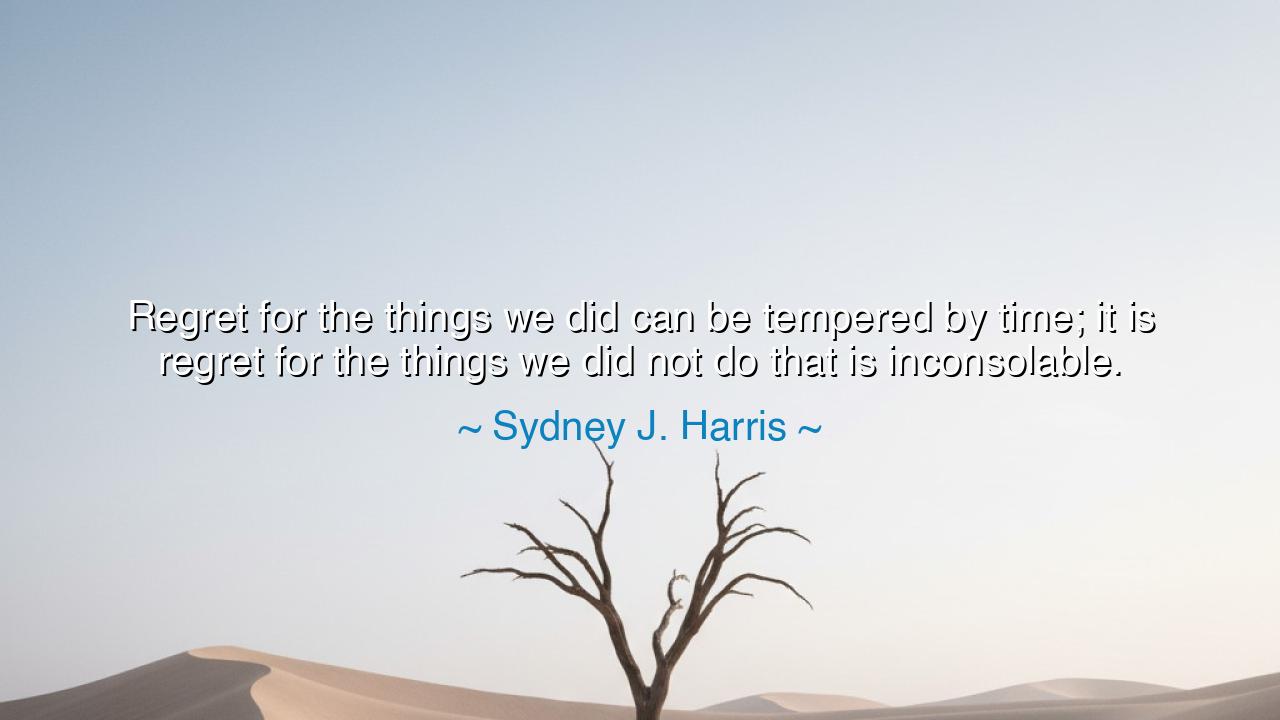
Regret for the things we did can be tempered by time; it is
Regret for the things we did can be tempered by time; it is regret for the things we did not do that is inconsolable.






The words of Sydney J. Harris, sharp observer of human nature, strike with the weight of eternity: “Regret for the things we did can be tempered by time; it is regret for the things we did not do that is inconsolable.” Here is wisdom that pierces the heart, for every man and woman knows the sting of regret. Yet Harris reveals a deeper truth: the wounds of our mistakes heal with time, but the emptiness of unlived possibilities lingers forever like a shadow upon the soul.
The meaning is profound. When we act, even if our choices lead to failure, embarrassment, or loss, the passage of time softens the blow. We learn from our mistakes, we grow in wisdom, and often we even laugh at what once brought us pain. But when we stand before a door and choose never to enter, when we silence the voice that calls us to dare, we leave behind a hollow that time cannot fill. This is the inconsolable regret—not of failure, but of never having tried.
The origin of this truth is found in the experience of countless lives. Harris, as a journalist and philosopher of the everyday, observed the quiet pain of people who carried unfulfilled dreams. The man who longed to speak his love but never dared, the woman who wished to explore the world but remained bound by fear, the worker who dreamed of invention but never took the risk—these, Harris saw, bore regrets more bitter than those who had tried and failed. His words remind us that inaction is often a heavier burden than failure.
History echoes this teaching. Consider Christopher Columbus, who sailed into unknown seas. Many of his contemporaries doubted, and some mocked his voyage as madness. He risked ruin, and indeed, his legacy is complex and marred by failure as well as discovery. Yet he acted, and the world was forever changed. Contrast him with those countless sailors who may have dreamed of venturing west but never left their harbors. Their names are lost, their regrets buried in silence. Better to bear the scars of action than the emptiness of inaction.
The deeper teaching is this: life is not measured by the safety of our choices, but by the fullness of our experience. Mistakes, when made with courage, become stepping stones of wisdom. Inaction, born of fear, leaves no wisdom, only emptiness. Harris calls us to embrace the risk of doing, for even if we stumble, the act itself enriches our journey. The saddest fate is not to have erred, but to have lived without daring.
The lesson for you, seeker, is clear: do not let fear of failure silence your steps. Speak the words you long to speak, attempt the deeds that stir your soul, pursue the dreams that whisper in the quiet hours. If you fail, time will soften the pain, and you will rise stronger. But if you never try, your heart will carry the weight of what might have been, a burden heavier than any failure.
Practical actions follow. Each day, ask yourself: “What would I regret not doing if today were my last?” Let that question guide your choices. Take risks with love, with work, with creation, with adventure. Do not wait for certainty, for it never comes. Dare, and let time temper your mistakes. Do not shrink into the comfort of inaction, for its comfort becomes a prison.
So remember, children of tomorrow: regret for mistakes fades, but regret for inaction endures. Let courage rule your days, and when you look back upon your life, may it be filled with the scars of daring rather than the silence of missed chances. For only those who act truly live, and only those who live leave behind a legacy that time itself honors.






AAdministratorAdministrator
Welcome, honored guests. Please leave a comment, we will respond soon